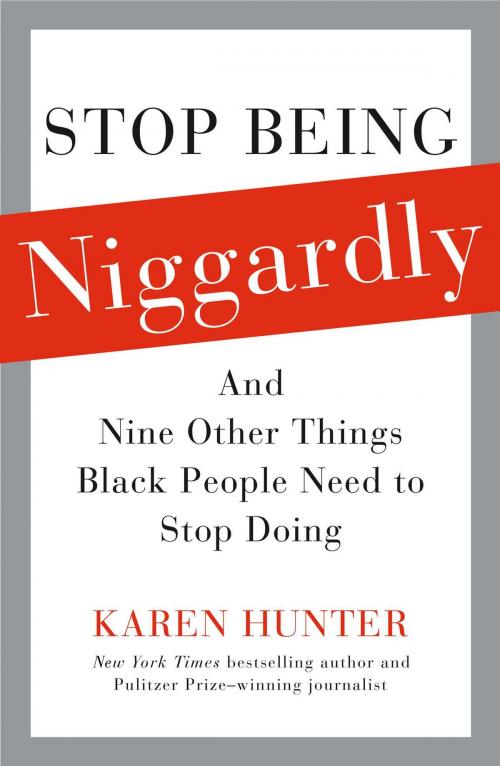Stop Being Niggardly
And Nine Other Things Black People Need to Stop Doing
Nonfiction, Social & Cultural Studies, Social Science, Cultural Studies, African-American Studies, Health & Well Being, Self Help| Author: | Karen Hunter | ISBN: | 9781439123706 |
| Publisher: | Gallery Books/Karen Hunter Publishing | Publication: | April 27, 2010 |
| Imprint: | Gallery Books/Karen Hunter Publishing | Language: | English |
| Author: | Karen Hunter |
| ISBN: | 9781439123706 |
| Publisher: | Gallery Books/Karen Hunter Publishing |
| Publication: | April 27, 2010 |
| Imprint: | Gallery Books/Karen Hunter Publishing |
| Language: | English |
nig·gard·ly (adj.) [nig´erd-le]
-
stingy, miserly; not generous
-
begrudging about spending or granting
-
provided in a meanly limited supply
If you don’t know the definition of the word, you might assume it to be a derogatory insult, a racial slur. You might be personally offended and deeply outraged. You might write an angry editorial or organize a march. You might even find yourself making national headlines
In other words, you’d better know what the word means before you pour your energy into overreacting to it.
That’s the jumping-off point for this powerful directive from Pulitzer Prize–winning journalist and bestselling author Karen Hunter. It’s time for the black community to stop marching, quit complaining, roll up their collective sleeves, channel their anger constructively, and start fixing their own problems, she boldly asserts. And while her straight-talking, often politically incorrect narrative is electrifyingly fresh and utterly relevant to today’s hot-button issues surrounding race, Hunter harks back to the wisdom of a respected elder—Nannie Helen Burroughs, who was ahead of her time penning Twelve Things the Negro Must Do for Himself more than a century ago. Burroughs’s guidelines for successful living—from making education, employment, and home ownership one’s priorities to dressing appropriately to practicing faith in everyday life—teach empowerment through self-responsibility, disallowing excuses for one’s standing in life but rather galvanizing blacks to look to themselves for strength, motivation, support, and encouragement.
From our urban communities to small-town America, the issues Hunter is bold enough to tackle in Stop Being Niggardly affect us all. Refreshingly candid and challenging, certain to get people everywhere talking, this is the book that takes on race in a new—yet also historically revered and
simply stated—way that can change lives, both personally and collectively.
nig·gard·ly (adj.) [nig´erd-le]
-
stingy, miserly; not generous
-
begrudging about spending or granting
-
provided in a meanly limited supply
If you don’t know the definition of the word, you might assume it to be a derogatory insult, a racial slur. You might be personally offended and deeply outraged. You might write an angry editorial or organize a march. You might even find yourself making national headlines
In other words, you’d better know what the word means before you pour your energy into overreacting to it.
That’s the jumping-off point for this powerful directive from Pulitzer Prize–winning journalist and bestselling author Karen Hunter. It’s time for the black community to stop marching, quit complaining, roll up their collective sleeves, channel their anger constructively, and start fixing their own problems, she boldly asserts. And while her straight-talking, often politically incorrect narrative is electrifyingly fresh and utterly relevant to today’s hot-button issues surrounding race, Hunter harks back to the wisdom of a respected elder—Nannie Helen Burroughs, who was ahead of her time penning Twelve Things the Negro Must Do for Himself more than a century ago. Burroughs’s guidelines for successful living—from making education, employment, and home ownership one’s priorities to dressing appropriately to practicing faith in everyday life—teach empowerment through self-responsibility, disallowing excuses for one’s standing in life but rather galvanizing blacks to look to themselves for strength, motivation, support, and encouragement.
From our urban communities to small-town America, the issues Hunter is bold enough to tackle in Stop Being Niggardly affect us all. Refreshingly candid and challenging, certain to get people everywhere talking, this is the book that takes on race in a new—yet also historically revered and
simply stated—way that can change lives, both personally and collectively.















